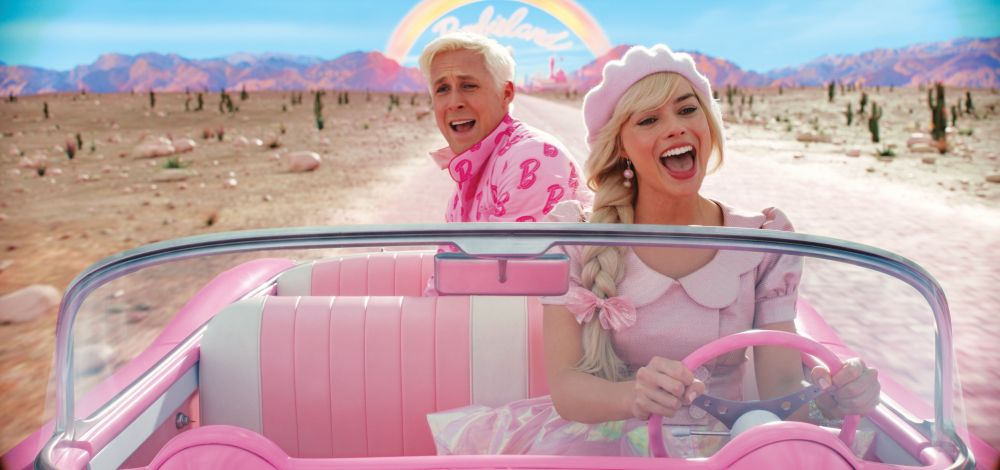So intense has been the advertising run-up to the Warner/Mattel candy-mobile Barbie that some may wonder what makes it worth the hype.
What’s so special about a loud, energetic, ultra-colorful summer movie devoted to a plaything that’s been in toy stores since 1959? The significant factor that presumably separates Barbie from the similarly heavily merchandised antics of Marvel/DC comics super-heroes, Transformers, Toy Story holdovers, rubbery mega-monsters and horny hotrods is that the thing herself, Barbie, seems to suffer from a crisis of confidence, a psychological/philosophical predicament. “What does it all mean?” wonders the insanely happy, gadget-and-wardrobe crazy, anatomically impossible, best-selling figurine.
Cracks begin to show in Barbie’s sunny, carefree demeanor. Like thousands of fictional protagonists before her, the otherwise flawless blond (Margot Robbie) is plagued by doubt. She even admits to herself a fear of death. None of the other inhabitants of Barbie Land offer our doll any remedy.
The Barbies (they’re all named Barbie) still throng to the beach en masse and have a slumber party every night, and Ken (Ryan Gosling), the ur-type conspicuous-consumer male designated as “Barbie’s boyfriend,” is shrink-wrapped in harmless machismo that turns aggressive. All his fantasies revolve around horses and a man cave called the Mojo Dojo Casa House, mostly because he and Barbie have never had sex. Barbie is left alone with only her insecurity to keep her company.
On the way to her epiphany, Barbie discovers unexpected kindred spirits, among them harried mom Gloria (America Ferrara), Gloria’s wised-up teenage daughter (Ariana Greenblatt) and Ruth (Rhea Perlman), a character modeled on the creator of Barbie, Ruth Handler. These grounded avatars awaken suppressed feelings (feelings suppressed by design by the Mattel CEO, a frothing Will Ferrel) that surge to the surface in Barbie’s key dialogue scene. It’s a show-stopper, a rousing declaration of her humanity.
But even that mission statement rings a little hollow in the face of the spectacle of Barbie Land. Barbie’s spiritual odyssey, featuring a few political barbs, is a bit corny, especially when pasted into the gaudy explosion of plastic “fun” all around her. Gerwig fans would probably like to believe that if she really had her way, the frantic carnival would be dialed down to make room for Barbie’s awakening, which is very basic and personal.
On the other end of the summer blockbuster is Oppenheimer, which opens in the late stages of World War II. The government is in a hurry to develop a nuclear weapon before the Nazis do, and brilliant scientist Oppenheimer is drafted into the effort despite conflicting convictions. As a former communist sympathizer and a Jew, Oppenheimer (in a magnetic performance by Cillian Murphy) is a question mark for the military brass and jingoistic politicians. But he’s still America’s foremost physicist.
“Oppy” is a bit of a romantic dreamer in addition to being a genius. His love life is complicated—his wife Kitty (Emily Blunt) is weary of enduring the presence of the scientist’s longtime leftwing girlfriend, Jean Tatlock (Florence Pugh). His professional career is a minefield of academic argument and intellectual snobbery. Oppenheimer’s chief detractor is government think-tank wonk Lewis Strauss (an almost unrecognizable Robert Downey Jr.), forever ready to challenge his rival’s leadership.
Then there’s the task of getting a bunch of quirky, insecure eggheads to work as a team. The film’s hectic pace, goaded by Ludwig Göransson’s penetrating score, keeps Nolan’s three-hour saga moving in high gear. It’s a pleasure to see a movie about intelligent people.
Professor Oppenheimer has an inner dimension that’s as morally complicated as it is photogenic. In his quiet moments, which are many, his thoughts drift off into classic Hindu religious texts, particularly the Bhagavad Gita. As his doubts multiply amid mounting political and military pressure, so do Oppenheimer’s moral qualms about unleashing the “destroyer of worlds.”
Explicit in Oppenheimer’s point of view is the idea that heading off the threat of nuclear annihilation should be the prime determinant of America’s Cold War policy, an opinion decidedly not shared by the country’s leadership. And so Oppenheimer must pay the price for acquiescing to the hardball military-industrial playbook in the first place.
Oppenheimer, a film energized by consequences dealt with every day for years, is a bracing argument in favor of anti-war activism that paradoxically uses the bomb’s awesome firestorm as a spectacularly ironic punctuation mark. Nolan’s film is some degree of masterpiece.
Barbie & Oppenheimer in theaters now.



